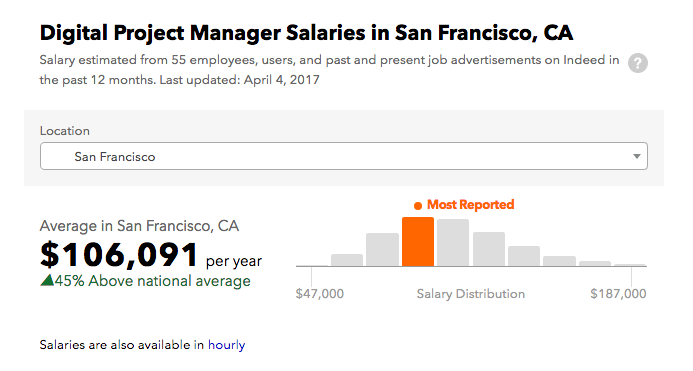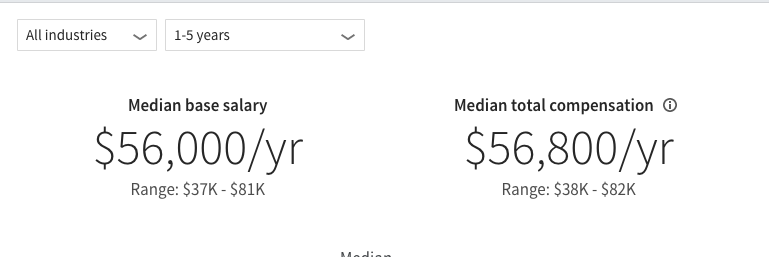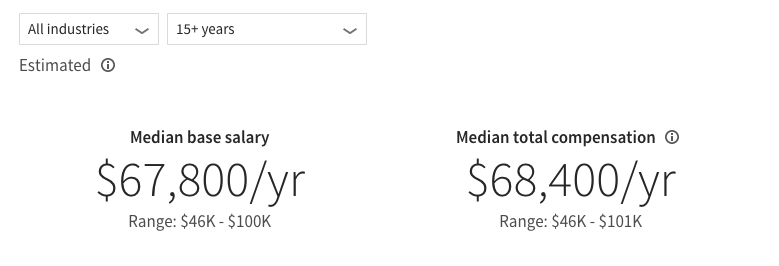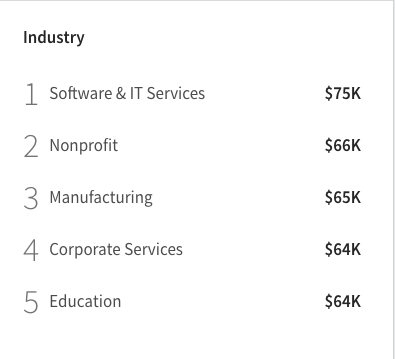Performing a salary comparison should be an yearly activity for each and every company owner, or HR manager. Doing annual salary comparisons ensures that you are paying your employees fairly and in line with the moving local market rate for their position. Not only is this the best practice from an HR standpoint, but it is going to also help prevent losing ability to competitors who are paying more.
Free Salary Comparison Tools
There are many salary comparison tools on the fantastic old net, but we recommend the next 5 salary comparison tools since the best to utilize. As we’ll explain below, every tool is good for different sorts of jobs. It’s also very important to copy your findings with at least 1 other source, to confirm the data is accurate.
#1 Indeed.com Salary Comparison Tool
Indeed is our recommended job board because it is the largest, incredibly simple to use and cheap. The Truly salary research tool is no different. It’s totally free and it is constructed from information from the job postings and job seekers that utilize Indeed, which tallies to the thousands of millions of postings and people.
To use it, simply enter the title of your job role, and locate the closest fit. Really will show you the typical salary, a chart of salary distribution and other information. Using the”Location” dropdown area on top, you may also filter this information by city or state.

Charge to Indeed Salary, April 17th, 2017
#2 LinkedIn Salary Comparison Tool
LinkedIn is a gold mine of data, collected from the polls it requires of its associates, job postings as well as the polls it requires of the employers that post their jobs on the planet. They left a super easy-to-use LinkedIn branded salary research instrument. The LinkedIn salary application has a wider range of functions compared to Indeed, so it is is especially helpful for highly specialized functions, technical functions, or greater degree roles like the Director level and over (that you might not find on Truly ).
LinkedIn is also exceptional in that you are able to compare salary based on years of expertise, which may be useful if you’ve got a multi-generational workforce or a variance in years of experience amongst your team members.
#3 Glassdoor Salary Comparison Tool
Glassdoor, like Indeed and LinkedIn, pulls its information in job postings and job seekers. While smaller than Indeed, Glassdoor still preserves great authority in the job market and uses data that is credible. It is possible to find their free salary tool here.
#4 Payscale Salary Comparison Tool
Payscale provides a higher degree of detail within their wages reports, including taking into account how many people the worker supervises and previous work experiences. You can see a sample report here.
However, Payscale is generally not free. As you do get one free salary account when you make an employer account, you will then have to pay for each report after that. It is also possible to try to skip it by pretending you are the worker himself; the wages estimator from the worker’s side is always free.
Number 5 The Bureau of Labor & Statistics
The federal government’s Bureau of Labor & Statistics is your first salary comparison tool. They monitor what Americans make professionally by location and job, and each the information is totally free. While not a great fit for newer functions, or tech-oriented tasks, there is a lot of great data here for the taking.
Let us now look further into how to do a salary comparison and what information points you’ll need.
The Way To Do A Salary Comparison
Let’s now walk through how you would perform a salary comparison step by step. There are 6 Chief factors that you need so as to perform one, and the Most Important two required by All the salary comparison tools would be:
- They need a Job Title.
- They require a Location.
These are the two main factors in doing a salary comparison. While place is straightforward, job name can be a be more complex than you think. Having accurate job titles for your team members may slide your radar as a small business operator, especially when employees have a wide range of job responsibilities. Try our occupation title guide to assist you figure out the proper title you should present your employees for a salary contrast.
By way of example, let’s talk about a easy job title difference: Sales Associate vs Sales Executive. In the Event That You were to look Both of These titles up with precisely the same place on Really’s salary tool, you would find info that (for your location set as Phoenix, AR):
- Sales Associate autocorrects to Retail Sales Associate. Average Annual Salary is $51,333.
- Sales Executive has an Average Annual Wages of $80,378.
Therefore, a job title can mean a $30K gap in pay. You will want to make sure the job titles you are giving your staff correctly reflects their job duties to be able to be certain your salary comparison is true.
Other Factors You Will Need For A Salary Comparison
The further you dive into a salary comparison, the more variables you’ll need to evaluate on. Some common examples of these other variables are:
1. Number of Years of RELATED Experience
The amount of years of experience a candidate has can be a huge factor in how much you should be compensating them. The matter of getting a high-value workforce can complicate matters these days, because candidates have a tendency to change professions over time. You have to then evaluate the number of years they’ve of related experience, regardless of how many years total work experience. Then, depending on the amount of years, determine how much extra salary the position should demand.
By way of instance, let’s choose the position of Website Developer. Let’s use the LinkedIn Salary instrument, which includes information on years of experience, to determine what we should cover two distinct Web Developers in Chicago, IL.
First, it is possible to see that we can look up”Web Developer” in Chicago, IL. When then come to the main display, at which you can then Choose the drop down to change the decades of experience:

So, let’s compare our Internet Developer candidate with 2 Decades of expertise:

To then our Internet Developer candidate with over 15 Decades of experience:

As you can see, we receive a very large difference: Almost $12,000. In this scenario, a seasoned web developer employee will probably expect to be compensated at least 20-25percent over their newbie colleagues. If you have noticed any trend of experienced workers leaving for other opportunities, you may want to scrutinize if they are being paid , which we discuss below. But before you give everybody a pay raise, let’s talk about schooling.
2. Degree Level
Another major element in determining salary is their education level. Instead of expertise, a business might hire someone with, say, an MBA because of the exceptional skill set or knowledge they bring to the table. But degree level, or when a candidate has a degree at all, has to be balanced with expertise when considering compensation.
A Web Developer is a perfect example for this job. Many computer programmers with over 15 years of expertise are self taught, and some may not have college degrees. However, they could code within their respective computer language at an expert level
So how do you decide what to cover that candidate, versus the candidate with a Master’s in Computer Science but just 2 decades of internet development expertise in the workplace?
Again, let us check the LinkedIn Salary instrument to figure out which Web Developers typically earn, based on their degree of education.

Internet Developer Average Salary vs. Education Level. Source: LinkedIn Salary Comparison
Most importantly we see how much a Web Developer earns with varying education levels, and 1-5 years of experience. At the Master Grade level, the Internet Developer earns a whopping $75K, despite needing only a couple years expertise. By comparison, the Web Developer with 15 years of experience but no degree earns only $64K per year or not, according to the LinkedIn Salary tool.
In this Web Developer situation, education appears to be a more important factor than experience. This won’t be true in each situation, so it’s important to look up this for your particular job title, industry and location. LinkedIn is a good (and free) place to begin, but you might also want to back up your findings using an account from Payscale or a different information source. You’ll also want to consider about two more factors, beginning with your business dimension, which we discuss next.
3. The Size of Your Company
As a small business (or startup), you are usually not expected to cover up to the Fortune 100. Common knowledge knows this since, since aside from not getting the financial resources, working for a small business has other perks, which we talk about below in our Total Compensation section.
Moving back to our original two factors, your location will be very important in deciding your compensation as a small business or startup (and your dimensions ). By way of instance, startups in San Francisco and Seattle offer”sweat equity” in their occupation offers such as common shares or partial ownership of the enterprise to attract top talent as a startup. Nonetheless, this isn’t quite as prevalent in Chicago or New York, and rather, startups in these cities will need to simply have the ability to pay in alignment with market rate for the talent they want.
4. The Business Your Business Is In
A final major factor you will want to consider when performing a salary comparison is for example what industry you are in. A Software-as-a-Service (SaaS) business versus a graphic design company are going to command various salaries for a similar role, like a Salesperson or even a Marketing Manager. That is when doing your study is crucial. You are going to want to use Really’s salary lookup tool, as well as perhaps LinkedIn’s or even Glassdoor’s to give perspective. You also might consider looking for comparison data for companies in your similar business and location using these very same tools.
Using our example of the Internet Developer in Chicago, Here’s a sample of what LinkedIn Salary tool informs us by industry:

Web Developer Average Salary vs. Education Level. Source: LinkedIn Salary Comparison
As soon as you collect these most important 6 factors for every job, you should be able to use one of the wages tools above to thoroughly get an idea of what your organization should be paying its group members. A compa ratio takes into consideration several of those aspects that will help you figure out a salary range. Learn more about compa ratio.
From Our HR Pro: How I Do A Salary Comparison
Doing a salary contrast, or even a”compensation analysis” in fancy phrases, is something which customers in my personal consulting business ask me to do frequently due to their small company’s roles. Ordinarily, it’s for a possible hire, but sometimes it is for a current employee.
So as to do this, I need the following from my customer:
- A job description (which includes the job name and location of work)
- The resume of the potential hire or candidate (which includes their experience and education level)
Since it is my client, I know how big their company is, along with the business they are in, which would be the remaining 2 variables of the 6 factors we discussed above that I want to need to perform a salary comparison.
Then, based on the level of the role, I go about the following:
- For a lesser level role like a hourly position or a position which, in general, will be $75,000 or not, I’ll use 2-3 of the salary comparison tools along with my go-tos are Truly Salary, Glassdoor, along with Payscale.
- To get a higher level role that’s technical or normally above $75,000, or needs an advanced degree, I will use Really Salary, LinkedIn Salary Tool, and Payscale.
ThenI create my customer a report which shows where the information came out, the ranges and averages of compensation for their job title and location, after which I provide an analysis of this information in layman’s terms along with a proposal of what I presume is an appropriate pay range for them as a company and for what I understand they are searching for in a new hire, factoring another things that I understand about the client, to make a entire settlement image, which we will talk about now.
A Word about Complete Compensation in Salary Comparison
As a small business operator, you want to consider more than just wages and benefits as your reimbursement program. What other things would you provide to talent? Why do people like working for you? Odds are, these matters can be calculated to that which we call”compensation”
Total compensation includes salary and things like:
- An Excellent firm culture
- Fringe employee benefits
- Typical benefits, such as health insurance
- A casual environment with flexible hours or working from home
- Other trendy employee-driven apps
Try to place a number on what the benefits and other cultural and environmental factors might be worth to a candidate. For example, I know several men and women that, if given the chance to work from home, would have a severe pay cut of 10-20% since then they don’t need to commute.
As a small company or startup, you’ll want to consider how to articulate total compensation in your supplies to prospective new hires. But, please note that the salary comparison programs do NOT include total reimbursement; they’re calculating salary independently in their data.
Let’s now examine what you found for your small business.
5 Signs Your Business Needs to Reevaluate Compensation
Before you dive in and do the research, you may be wondering in the event that you have to worry about compensation analysis at the first place. Here are 5 signs– 3 hints that you are spending too small and two signs which you are paying too much– that will provide you motivation to perform a salary comparison analysis to your team members.
3 Signals Your Business is Paying Employees Too Little
Generally, my experience as an HR consultant has advised me that most small business owners understand when they are paying too little. From time to time, it’s a budget problem. From time to time, it’s a fear of sustaining the salary. Occasionally, it’s both. But If You’re not certain and are wondering if you are paying too small, You May Want to think about:
1. Employee Turnover
If you observe that you are losing employees faster than you can recruit them, or perhaps you’ve detected a mass exodus of your team members to your opponents, then you want to consider your settlement plan as it standsout. If your worker turnover is over 20 percent (we show you how to compute that in this essay ), you are going to want to know if cover a part of the rationale team members are leaving your company. Look at applying exit interviews or an employee engagement survey that also addresses wages.
2. Frustrated, Complaining Employees
If your workplace door feels like a revolving door for conversations with frustrated employees (or by frustrated managers who are dealing with this on the floor ), then you might have to do a salary contrast. While overall unrest isn’t always related to cover, it certainly can be. As we advocated before, you may want to try an employee engagement survey that addresses compensation for to the root of this unrest, in addition to other constructs like office environment, direction, and employee recognition.
However, Harvard Business Review writes a piece counter-intuitive for this information that points out how most people don’t have any IDEA what the going market rate is for their function. This can make salary lookup through our free salary comparison tools even stronger, because it will allow you to explain your compensation rationale to any frustrated workers, if necessary.
3. Recruitment is a Long Nightmare
Do you dread when a position opens up at your business since you”know it is going to take forever to fill”? Is that because you’re always looking for a diamond in the rough; the somehow-superstar who doesn’t understand their value? If recruiting is a continuous battle where you’re always discovering that candidates you need are too expensive, you need to adjust your preferences, change the job title and duty of the job you’re recruiting for, or you want to consider that you’re underpaying for what you really want.
Now, let us look at the other side of this coin (no pun intended).
2 Signals Your Company Is Paying Employees Too Far
You could be thinking,”wait, what small business owner is paying somebody an excessive amount?” Well, this happens more than you might imagine. Perhaps you’ve got a candidate that you can’t resist hiring or a smooth-talker who frees one of their worth when negotiating salary. Maybe you feel the need to give annual increases to long-time workers”just because.”
Let us look at two common situations where you might be paying too much:
1. The Paragraph Above Rang A Bell
Should you read that above paragraph and immediately thought of an employee or two, return to the top of this guide and do your own research. You need to be mindful if you’re paying the person too much, or if perhaps instead you are reflecting on a performance issue that they’re having. While you are there, look up all your rankings with the free salary tools so that you have some data to begin from.
2. Recruitment is Too Easy
If you operate a small business with an hourly staff and you constantly have referrals, walk ins, and other applicants out of the sky, it could be that your employees are bragging just how much they make to their friends. Granted, it might just be that they GENUINELY love working for you, however it does not hurt to assess business wages criteria to make sure, particularly if you’re in a traditionally higher turnover market.
Granted, the old adage of”you get what you pay for” holds true here. You might wish to do a little math: how much is it worth to pay more over always needing to recruit? It may be worth it to pay more than your competition if it supplies you time and cost savings in recruitment processes.
So, how do we solve these difficult problems? Particularly if we’re paying a lot of?
Solutions for Compensation Issues
Now that you have completed your research and figured out if you are spending a lot, paying too small, or perhaps your results varied across the board, you need to determine what you would like to do for this information.
Here are just 7 solutions about what to do next if you discovered postings from what you should or should not be paying and the market rate. And remember, double check your research and use more than 1 of our resources above to get a better view.
If You’re Under-Paying:
First, try not to worry too much about if there’s space in the budget for paying more. We will discuss a few choices here that isn’t going to break your bank.
- Of course, when you can pay a bit more, particularly to the employees who deserve it, then do this. Also, think about implementing a performance management system and supply performance-based raises, as opposed to automatic pay increases annually.
- Try something else that will motivate people to do, like an employee recognition program or a commission chance for workers that are in jobs that could be incentivized to market. This is a dual win- you get more performance and a growing business and they increase their cover!
- Implement a Paid Time Off (PTO) policy and paid holidays if you don’t already have one or the other. This is really a pay raise which has big value for workers.
- Try using fringe benefits, like an employee health plan, commuter benefits, or something else that would have real value to employees over just money. Think about doing a questionnaire if you are not sure what could make the most sense for your group.
However, what about the other side? What if you’re spending too much?
If You’re Over-Paying:
This is a challenging situation. Can you downgrade someone’s pay? Is that legal? The answer to both questions is yes (but you probably shouldn’t). So what can you do?
- You’re able to implement a performance management system that rewards for achievement and files performance issues so you can readily fire somebody or make a shift in your team.
- You can change the method by which the person gets compensation; for instance, executing a quota system or commission program that allows them to be paid at nearly the exact same degree, but only as long as their functionality backs up it. But should you change your settlement plan, be aware that you may lost talented employees who get frustrated at this shift.
- Chalk it up to a learning experience and understanding what you should be paying for the next time you recruit. Knowledge is power, and now you understand to research salaries before supplying an offer.
The Most Important Thing
Knowing your business’s compensation strategy and amounts versus your competitors and in the regional marketplace is essential for several reasons. You are going to want to balance your choices on how much you spend with the talent you are spending the money on carefully and completely, as well as do your research on the market on your small business.

